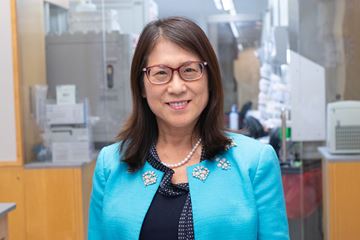 Shumei Song, MD, PhD
Shumei Song, MD, PhDProfessor
I am a Professor in Coriell Institute for Medical Research in Camden, New Jersey. I received my PhD in Molecular Biology and Biochemistry from Beijing Cancer Institute, Beijing University, China where my graduate work focus on the cloning and elucidating the functional role of the VEGF receptor KDR on tumor angiogenesis and tumor metastases in gastric cancer. After obtaining my Ph.D at 1999, I immediately pursue my postdoctoral fellowship in UT, MD Anderson Cancer Center in Houston and focus on cancer biology in gastrointestinal cancers especially specifically in the esophagus, the area of the body where the esophagus joins the stomach, also known as the gastroesophageal (or GE) junction and gastric cancer. I have been gained extensive experience in gastrointestinal cancer biology, gene transcription and expression regulation, and molecular approaches to investigate the molecular mechanisms of GE junction and gastric cancer initiation, progression, and metastasis.
As an independent investigator, my laboratory and the team are working to investigate the molecular mechanisms and novel targets focusing on how deregulation of Hippo/YAP signaling in mediating CSCs traits, therapy resistance and metastases in gastroesophageal cancers. One of the major projects in the laboratory is to decipher how Hippo/YAP/TAZ or other stem cell factors SOXs mediated immunosuppressive tumor microenvironments and the interaction among tumor cell, macrophage, CAFs and T cells for novel therapeutic strategies. The long-term goal is to develop YAP1/TAZ/TEAD inhibitors for targeted therapy of gastrointestinal cancers and discover novel target and immunotherapy in advanced GI tumors by fully exploring patients derived tissues/cells.
Before Coriell, I was a Professor in the Department of Gastrointestinal Medical Oncology at the University of MD Anderson Cancer Center in Houston, Texas where I focused on GI cancer research for more than 20 years.
 Yanting Zhang, PhD
Yanting Zhang, PhDAssistant Professor
I received my Ph.D. in Biochemistry and Molecular Biology from Jinan University under the mentorship of Prof. Xian-hui He. My doctoral research focused on the anti-melanoma effects of cucurbitacin B and its underlying molecular mechanisms. This work has been highly cited and has contributed significant insights into how cucurbitacins act
on the actin cytoskeleton, supporting their development as potential anticancer agents(PMIDs: 21642275, 21628505, 24691407, 23695982, 22699368).
After completing my Ph.D., I joined Dr. Hancai Dan at the University of Maryland School of Medicine as a postdoctoral fellow, helping establish a new laboratory focused on prostate cancer research (PMIDs: 26374334, 27196761).
From 2016 to 2020, I worked in the lab of Prof. Frank McKeon at the University of
Houston. Under his guidance, I contributed to gastrointestinal (GI) stem cell research using a novel culture system developed by his team (Wang Xia et al., Nature, 2015,PMID: 26040716). My early projects explored the region specific regulation of humanfetal GI stem cells, leading to the identification of key genes involved in GI tract development.
During my time in Prof. McKeon's lab, I successfully cultured mouse stomach stem cells, performed air-liquid interface (ALI) analysis, prepared samples for RNA expression profiling, and conducted animal model studies. In 2017, I collected treatment-naive biopsies from cancer patients and successfully cultured patient-matched stem cells across the Barrett’s esophagus–dysplasia–adenocarcinoma sequence. This enabled the construction of a high-resolution evolutionary map of esophageal adenocarcinoma using patient-derived stem cells (AACR Abstract).
This work led to two research grants from the National Cancer Institute, one patent application, and the development of a drug screening platform.
Later, I joined the lab of Prof. Shuan Zhang, where I completed a project that involved engrafting a surrogate antigen onto the tumor cell surface via the pHLIP peptide to enhance CAR-T cell targeting of solid tumors (PMID: 39489212).
Before joining Coriell, I was part of Dr. Eric Jonasch’s team at the University of Texas MD Anderson Cancer Center, where I worked on renal carcinoma and DNA damage–related research (PMID: 37527013).
Since joining the Coriell Institute, I have been investigating therapeutic strategies for gastroesophageal cancers, including the use of CDK9 degraders (PMID: 40060472) and YAP/TEAD inhibitors, while continuing to explore novel targets for GI cancer therapy.
If you are interested in learning more about my research, please feel free to contact me at yzhang@coriell.org or visit my profiles:
Research Scientist
I received my PhD in medical biochemistry from Gothenburg University, Sweden, and immigrated to Canada 1999. My research fields encompass molecular biology, virology, and immunology for more than 25 years. I have worked in the United States since 2019, and has focused on tumor biology/immunology.
I currently work with Dr. Song and team, focusing on the interaction of cancer cells with cancer-associated-fibroblasts (CAF) and macrophages and T cell response by running variety experiments in vitro and mouse models in vivo. I'm exploring multiple molecules at immune suppressive checkpoints, including YAP1, TIM3, and DDK1, etc. to search mechanisms behind their complex actions on T cell immune responses. I'm also involved in immunotherapeutic experiments with neutralizing antibodies combined with novel target therapies.